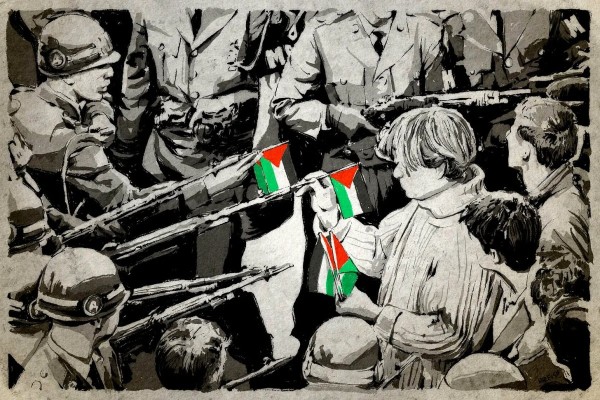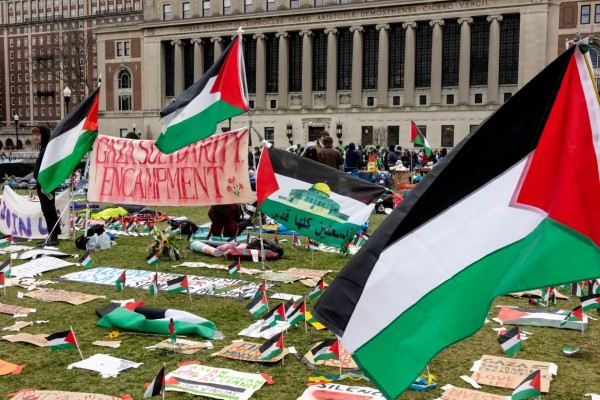On not teaching Palestine
“How do you tell a student who earnestly feels that they are in danger that you think their fears are unfounded or exaggerated?”

Organizers with Students Against Israeli Apartheid (SAIA) gather at York University in Toronto on November 20, 2019. Photo courtesy Independent Jewish Voices Canada.
It snowed that morning, but by the afternoon it had already turned to ice and slush. Grey clouds lowered over Sherbrooke and the cold seeped through my clothes. The lights of silent police cruisers blinked through the haze. Traffic was stopped in two directions and to my left, in front of Scotiabank’s Montréal headquarters, a crowd had gathered, dotted with keffiyehs and Palestinian flags. “Resistance ≠ Terrorism” read one sign. “From Palestine to the Philippines,” began another, “Stop the US War Machine.” Words garbled through a megaphone were answered by hundreds of protestors in one voice, echoing clearly in the street. I watched from a distance on the sidewalk, but only for a moment. I felt conspicuous, only steps from the classroom where I teach.
That afternoon I had been stopped by a student who wanted to attend a pro-Israel rally happening the next week in Washington, DC. The rally was scheduled on the same day she was meant to give a presentation. This student had emailed me the day before, asking to switch into an open slot that afternoon, which I didn’t feel was fair to the students who would have had to scramble to read her work. At the time she had billed the event as a rally against “antisemitism,” which of course I support. On Instagram I saw that organizers of the rally were alleged to be paying up to $250 per person to attend. That morning my friend, Anna, whose family is half-Arab and half-Jewish and whose grandmother is a Holocaust survivor, posted that there hasn’t been a day since Israel began its genocidal war on Gaza that she hasn’t wept for the crimes carried out in her name. Another student, Ben, sent a video of a counter-protest on Toronto’s Yonge Street the day after more than 25,000 rallied in front of the US consulate in support of Palestine. In the video, a line of pick-up trucks flying Israeli flags races by, horns and electronic music blaring. As Ben finished recording, two men exited a truck and questioned him, asking if he is Jewish.
How do you tell a student who earnestly feels that they are in danger that you think their fears are unfounded or exaggerated? That was the question that came to me in the classroom, and the one that animated this essay. Maybe it’s unnecessary. A group chat of fellow adjuncts and late-term PhDs who share my politics have advised me to keep my head down. “You don’t want to be blacklisted,” one said. “You can’t help anybody if you don’t have a job.”
Last week, the Montréal Gazette reported on a recent demonstration that turned ugly. It took place only a few blocks away from where I teach, on the Concordia University campus, between pro-Palestine and pro-Israel students. At issue were the posters of kidnapped Israelis being held hostage in Gaza since October 7. Given the IDF’s commitment to turning every corner of the crowded coastal enclave into rubble, these posters seem about as sincere as the anti-abortion posters that periodically turn up in every major city in Canada, meant to divide and trigger outrage. The Gazette reported, too, on a firebombing at a Jewish synagogue, where no one was hurt (thank God) and a woman at the Concordia protest who might have said “kike” but probably said “cunt.” I have since seen several videos which seem to back that up.

I do not doubt that antisemites are coming out of the woodwork now, though I do doubt that they are same people who want to show solidarity for Gaza. I feel bitter that even voicing solidarity for the tens of thousands of Palestinians suffering and trapped and labelled as “human animals” by the Israeli government is deemed a political act and one that might cause me to lose my job, or be prevented from getting another one elsewhere.
I have not mentioned the attacks in class and have felt spineless ever since, especially as news of the escalating violence proliferates on social media. Last month, one of my students left class early, upset, she later told me, because of everything happening in the Middle East. But in my shame I didn’t ask her to elaborate. For the next few weeks she served as my conscience, a reminder of how I have failed to address this genocide, one that has been largely endorsed by Western states, including Canada. But this student is the one who volunteered to trade her presentation slot with the student going to Washington. Maybe I have it all wrong. She is upset for Israel, not for what they are doing to Palestinians. That I was right to be paranoid is one reason I feel so dismayed.
I keep thinking about these lines from a letter from the editor published by Arielle Angel of Jewish Currents, addressing the pain of Jews who feel like the violence perpetrated against them during the October 7 attack was being celebrated by leftists who sympathize with Palestine:
I found myself returning to the foundational Jewish liberation myth: the Exodus… I thought of the plagues themselves, particularly the final one, the slaying of the first born—children, adults, the elderly. It seems that hiding in our liberation myth is a recognition that violence will visit the oppressor society indiscriminately.
I know that I have many friends, and that Currents has many readers, who are asking themselves how they can be part of a left that seems to treat Israeli deaths as a necessary, if not desirable, part of Palestinian liberation. But what Exodus reminds us is that the dehumanization that is required to oppress and occupy another people always dehumanizes the oppressor in turn.
It is disingenuous to look at a people held hostage by another, whose electricity, water, and freedom of movement is controlled by a nation that sees them as vermin to be exterminated, and to debate whether their efforts at liberation are justified. Sarah Schulman’s Conflict is Not Abuse, a book which documents tactics that aggressors use to justify violence and evade accountability, includes a chapter on Israel’s treatment of Palestinians. She opens that chapter by talking about three teenagers who were killed in a rogue action by Hamas in 2014. Though the Israeli government had credible evidence that the teenagers were dead, they claimed they were kidnapped, and still alive, and so the IDF began indiscriminately invading Palestinian homes. “Over the next eighteen days, under the pretext of ‘searching’ for the Hamas members who were supposedly holding the teenaged boys, 400 Palestinians were arrested, 5,000 homes were raided, and six Palestinians were murdered by Israeli gunfire.” Then, as now, Netanyahu was in charge. Then, as now, the Israeli government was more concerned with reprisal than those being held by Hamas. Many of these latest hostages have surely been killed by Israeli bombs.
I think the Reichstag fire, and not Kristallnacht, is the event that the West should be thinking about now when it comes to Israel. On February 27, 1933, the German parliament burned to the ground due to apparent arson, leading to emergency legislation that put restrictions on the press and on political gatherings; because the fire was blamed on the communist party, it also gave the Nazis the freedom to arrest their political rivals. It was the justification they needed to concentrate their power and begin their terror campaign. Though communists and socialists too were killed in the Holocaust, they are far from being a protected class as a result of that violence. There are many good reasons for this, which I think as I exit the subway and walk down my street, having said and done nothing. One is that it’s much easier to escape yourself, and renounce what you believe, when they come for you.
This article is published under a pseudonym to protect the author from political persecution or retribution for their writings.










_(51194337627)_600_400_90_s_c1.jpeg)